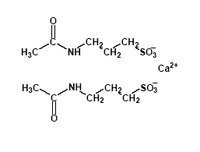EVIDENCE BASED ANSWER Naltrexone (ReVia) and nalmefene (Revex) are the most effective agents for treating alcoholism. Acamprosate is effective but not available in the United States. Serotonergic agents, selective serotonin reuptake inhibitors (SSRIs), and lithium work best in patients with alcoholism and comorbid depression, anxiety, or bipolar disorder. Disulfiram (Antabuse) decreases drink frequency, but is no better than placebo for other outcomes. Greater effectiveness is achieved when pharmacologic agents are combined with either counseling or Alcoholics Anonymous programs. (Grade of recommendation: B, based on multiple randomized controlled studies with short and incomplete follow-up of patients.)
EVIDENCE SUMMARY Naltrexone (50 mg qd), nalmefene (10-80 mg qd), and acamprosate (dose based on patient weight) are all superior to placebo and other agents such as the SSRIs, disulfiram, and serotonergic agents in reducing relapse rates and the phenomena of craving and in increasing abstinence rates. (1-5) For example, naltrexone reduces relapse rates by one half to two thirds. (4,6) However, these outcomes apply only to patients who completed the study protocol; noncompleters accounted for up to more than 50% of study participants. When compared with placebo, nalmefene taken for 3 to 24 months significantly reduced relapse without affecting abstinence rates or cravings. (3) When compared with placebo, disulfiram failed to significantly increase abstinence rates or decrease relapse rates or cravings. (2)
In European studies, acamprosate taken for 3 to 24 months significantly increased abstinence rates, but did not significantly decrease relapse or cravings as compared with placebo. (3) Fifteen studies evaluating serotonergic agents, lithium, and SSRIs (including citalopram, viqualine, fluoxetine, and others) taken for 2 to 12 weeks have shown promise for increasing abstinence rates and decreasing cravings in alcoholic patients with coexisting psychiatric conditions such as depression, anxiety, and bipolar disorder. (2,7,8) Studies combining pharmacologic intervention with Alcoholics Anonymous's 12-step program or psychological interventions showed the most significant effects on decreasing cravings and relapse rates and increasing abstinence rates. (2,3,6,9-12)
RECOMMENDATIONS FROM OTHERS
According to the American Society of Addiction Medicine, patients who comply with a combination of medication, education, and counseling have favorable short-term and long-term benefits. (1) Naltraxone and acamprosate effectively reduce cravings and increase abstinence.
REFERENCES
(1.) Garbutt JC, West SL, Carey TS, Lohr KN, Crews FT. Pharmacological treatment of alcohol dependence: a review of the evidence. JAMA 1999; 281:1318-25.
(2.) Fiellin DA, Reid MC, O'Connor PG. New therapies for alcohol problems: application to primary care. Am J Med 2000; 8:227-37.
(3.) Chick J, Anton R, Checinski K. et al. A multicentre, randomized, double-blind, placebo-controlled trial of naltrexone in the treatment of alcohol dependence or abuse. Alcohol Alcohol 2000; 35:587-93.
(4.) O'Malley SS, Jaffe AJ, Chang G. Schottenfeld RS, Meyer RE. Rounsaville B. Naltrexone and coping skills therapy for alcohol dependence. A controlled study. Arch Gen Psychiatry 1992:9:881-7.
(5.) Mason BJ, Salvato FR, Williams LD, Ritvo EC, Cutler RB. A double-blind, placebo-controlled study of oral nalmefene for alcohol dependence. Arch Gen Psychiatry 1999; 56:719-24.
(6.) O'Connor PG, Farren CK, Rounsaville BJ, O'Malley SS. A preliminary investigation of the management of alcohol dependence with naltrexone by primary care providers. Am J Med 1997;103:477-82.
(7.) Fawcett J, Clark DC, Gibbons RD, et al. Evaluation of lithium therapy for alcoholism. J Clin Psychiatry 1984: 45:494-9.
(8.) Merry J, Reynolds C, Bailey J, Coppen A. Prophylactic treatment of alcoholism by lithium carbonate. A controlled study. Lancet 1976: 1:481-2.
(9.) Srisurapanont M, Jarusuraisin N. Opioid antagonists for alcohol dependence (Cohrane Review). In: The Cochrane Library, Issue 4 2001. Oxford, England: Update Software
(10.) O'Malley SS, Jaffe AJ, Chang G, et al. Six-month follow-up of naltrexone and psychotherapy for alcohol dependence. Arch Gen Psychiatry 1996; 53:217-24.
(11.) Graham AW, Schultz TK, Wilford BB, eds. Principles of Addiction Medicine. 2nd ed. Chevy Chase. MD: American Society of Addition Medicine. Inc.; 1998.
(12.) Jaffe AJ, Rounsaville B, Chang G, Schottenfeld RS, Meyer RE, O'Malley SS. Naltrexone, relapse prevention, and supportive therapy with alcoholics: an analysis of patient treatment matching J Consult Clin Psychol 1996; 64:1044-53.
http://www.fpin.org.
COPYRIGHT 2002 Appleton & Lange
COPYRIGHT 2002 Gale Group



